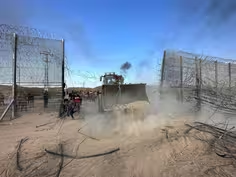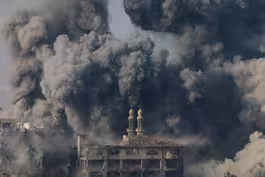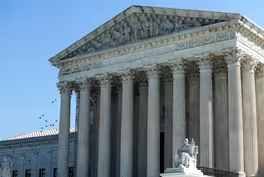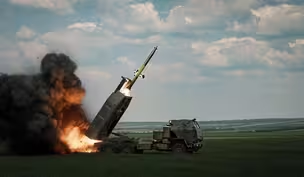
Gaza cut off from supplies as Israel’s bombardment continues
Clip: 10/11/2023 | 12m 36sVideo has Closed Captions
Gaza cut off from food, water and fuel as Israel’s punishing bombardment continues
Death tolls soared on the fifth day of heavy fighting between Israel and Hamas. More than 1,200 Israelis and 1,100 Palestinians are now dead with many still missing. In Gaza, the last power station has run out of fuel, there will soon be no electricity, no water or sanitation and food is starting to become scarce. Amna Nawaz and Leila Molana-Allen report from Israel.
Problems playing video? | Closed Captioning Feedback
Problems playing video? | Closed Captioning Feedback
Major corporate funding for the PBS News Hour is provided by BDO, BNSF, Consumer Cellular, American Cruise Lines, and Raymond James. Funding for the PBS NewsHour Weekend is provided by...

Gaza cut off from supplies as Israel’s bombardment continues
Clip: 10/11/2023 | 12m 36sVideo has Closed Captions
Death tolls soared on the fifth day of heavy fighting between Israel and Hamas. More than 1,200 Israelis and 1,100 Palestinians are now dead with many still missing. In Gaza, the last power station has run out of fuel, there will soon be no electricity, no water or sanitation and food is starting to become scarce. Amna Nawaz and Leila Molana-Allen report from Israel.
Problems playing video? | Closed Captioning Feedback
How to Watch PBS News Hour
PBS News Hour is available to stream on pbs.org and the free PBS App, available on iPhone, Apple TV, Android TV, Android smartphones, Amazon Fire TV, Amazon Fire Tablet, Roku, Samsung Smart TV, and Vizio.
Providing Support for PBS.org
Learn Moreabout PBS online sponsorshipGEOFF BENNETT: Welcome to the "NewsHour."
A fifth day of heavy fighting between Israel and Hamas today, as the death tolls soar.
More than 1,200 Israelis and 1,100 Palestinians are now dead, with many still missing.
There are 22 Americans confirmed killed in Saturday's terror attacks across Israel, and Hamas holds an unknown number of hostages in Gaza.
AMNA NAWAZ: Here in Israel, the fear of a wider war seemed very real earlier after reports of drones and incursions from Lebanon.
Those turned out to be false alarms.
In the meantime, in Gaza, the last power station has now run out of fuel.
There will soon be no electricity in Gaza, along with no water and nor sanitation.
And food supplies are starting to become scarce.
Our colleague Leila Molana-Allen begins our coverage.
LEILA MOLANA-ALLEN: Block by block, Gaza is being blasted into dust, as Israel's punishing bombardment continues.
For the fourth day straight, residents woke up to a landscape of horror.
The streets of this densely populated coastal enclave are in chaos, as people rushed to clear the debris after Israeli airstrikes pummeled their neighborhoods.
Israel says it targeted a Hamas commander, but civilians say they are bearing the devastating consequences.
Abu Hassan's home was bombed without warning.
ABU HASSAN, Gaza Resident (through translator): All of the people living in the house are killed inside it, and all of our neighbors.
Where is the international community?
LEILA MOLANA-ALLEN: The strikes are part of Israel's retaliation against Hamas for the weekend's bloody terror strikes.
Today, the Israel Defense Forces released video of warplanes striking Gaza's Islamic University.
It says Hamas used it for training and producing weapons.
And Israel is striking critical infrastructure, including Gaza's port.
The entire Gaza Strip is under a total blockade, with more than 250,000 people displaced.
Israel has cut off all supplies of food, water and fuel.
To survive, residents help each other however they can.
AHMED YOUSSEF MEKHIMAR, Gaza Resident (through translator): I send water to those who have had their houses demolished.
All those who have been displaced don't have anything.
All they have is suffering, fear and horror.
LEILA MOLANA-ALLEN: And now Gaza will soon sink into darkness.
Its last operational power plant today stopped working after it ran out of fuel.
"NewsHour" producer Shames Ouda spoke to us from near the plant.
SHAMES OUDA: This power station served all Gaza Strip, and now is turned off, Gaza without fuel, without electricity, without Internet, without food.
Gaza dying.
The people will pay the price of this war.
LEILA MOLANA-ALLEN: Inside hospitals, it's a race to save the wounded, but supplies are dwindling.
DR. ASHRAF AL-QIDRA, Spokesperson, Gaza Ministry of Health (through translator): The quantity of injured people arriving to our hospitals is huge and will mean we will not be able to accept more patients in Gaza.
LEILA MOLANA-ALLEN: Across the border, Hamas' rocket barrage continued to overwhelm Israel's Iron Dome defense system.
One rocket slammed into a medical center for children in the city of Ashkelon, all while Israelis spent another day burying their dead and promising retribution, as the army calls up hundreds of thousands of reservists to join the fight.
YOAV GALLANT, Israeli Defense Minister (through translator): And I'm saying here to everyone we will wipe this thing called Hamas, ISIS Gaza, off the face of the earth.
It will cease to exist.
LEILA MOLANA-ALLEN: The state of emergency has prompted a major shakeup in Israel's government.
Prime Minister Benjamin Netanyahu and opposition party leader Benny Gantz said today they agreed to form a wartime unity government, a move that just a week ago would have seemed impossible, now deemed a necessity.
The U.S. has promised support.
And at a roundtable with Jewish community leaders in the U.S., President Biden again addressed the conflict.
JOE BIDEN, President of the United States: My commitment to Israel's security and the safety of the Jewish people is unshakable.
It is really important that Israel, with all the anger, frustration, and just -- I'm not explaining it -- that exist is that they operate by the rules of war.
LEILA MOLANA-ALLEN: The violence has now spread north of the Gaza Strip.
Israel's promised retribution was on full show today in occupied East Jerusalem.
Last night, two young Palestinian men were shot dead in Silwan by Israeli border police after throwing fireworks.
This morning, 24-year-old Ali Abbasi's family had gathered here at his house to mourn his death.
Security forces have just turned up to raid the home of one of the young men who was killed in Silwan last night.
They have gone into his home, firing tear gas to disperse the crowds and into the air to make sure everyone else in the neighborhood stays inside their houses.
Residents claim security forces stopped medics reaching the men and they bled to death.
The anger is palpable, as is the fear of more killing to come.
NAHIDA SALMAN, Aunt of Ali Abbasi (through translator): The Israelis come, they arrest our young men, demolish our houses, attack our women.
Why?
We fear for the future of this generation.
I wanted my nephew to get married.
Instead, he became a martyr.
LEILA MOLANA-ALLEN: Nearby Issawiya is sometimes called Little Gaza for its Palestinian only-population and for its residents' reputation for resisting Israeli laws that they believe discriminate against Arabs.
Israel's security forces have taken the name literally.
After Saturday's horrific terror attacks by Hamas around the Gaza border, Issawiya was raided in full force on Saturday night.
OSAMA ISSAWI, East Jerusalem Resident (through translator): They were furious.
You didn't know what was going in their minds, because they were looking for someone to get revenge from.
LEILA MOLANA-ALLEN: Osama Issawi has lived in Issawiya all his life.
His is the first house after the village's entrance, and his family bears the full brunt of every raid.
Since Saturday, he says Israeli special forces have invaded the village almost daily, shooting tear gas and live fire and wounding and detaining an as-yet-unconfirmed number of young men.
He says Palestinian communities are being punished for someone else's crimes.
OSAMA ISSAWI: We feel this kind of anger about this.
We do feel that there is no justice in what's going on.
AMNA NAWAZ: And Leila Molana-Allen joins me here live in Tel Aviv.
Leila, good to see you.
LEILA MOLANA-ALLEN: Good to see you, Amna.
AMNA NAWAZ: Just incredible reporting over these last few days.
I know you spent today speaking with a number of other Palestinian families in Jerusalem and in the West Bank.
What else are they telling you about what life is like at this moment?
LEILA MOLANA-ALLEN: Well, these tensions from down in Gaza are really boiling over, and you can see that this has actually been the most violent year in nearly two decades in the West Bank already, before any of this was happening.
I was here in July reporting on that.
And now, of course, that violence has shifted down to Gaza, but we're seeing it spread.
In the piece there, you saw the retaliation by security forces against young men in Jerusalem.
But we're also seeing battles between civilians.
There was a bus driver I met today, an Arab bus driver in Jerusalem, who was driving his normal bus route for the main Israeli bus company.
And some settlers saw him, young settlers on the street, and attacked the bus, throwing rocks, and managed to injure his eye.
He'd lost the vision in one eye.
He'd stopped working.
He was too scared to go back to work.
And he said this has happened to a few of his other colleagues in the last couple of days, people seeing an Arab driver and attacking them.
We contacted the company for a comment, and the company said to us, "This is a time of war, and we have no further comment" about their own employees.
So that's how difficult this is getting.
And, of course, once you get outside of East Jerusalem, which is contested, you're then in the West Bank, which is even more contested, because, of course, there are settlements being built there.
And as more and more of these settlements are built, the reason this is such an issue, they are deemed internationally illegal, but also the reason it's so important is, that's where a two-state solution would be.
So the more Israeli settlements that are built in the West Bank, the less chance there ever is of that two-state solution So we drove out.
We heard that settlers were blocking the roads, which is something they do quite often when they're angry about something, when they have an axe to grind.
There have been several Palestinian villages that have been burned by settlers this week.
We got a certain amount down the road and we suddenly started seeing smoke, we started hearing gunfire.
And this wasn't settlers.
It was Ramallah.
And I went and spoke to the IDF who were standing outside, the soldiers there.
And they said: "Look, take care of yourself.
We're expecting serious trouble, and there's nothing we can do for you if something kicks off, because we have been told to be here and alert."
What's happened is that they have been threatening to do this for several days.
They have now blocked off the entrances to every Palestinian town and village in the West Bank.
You are not allowed to move as a Palestinian unless you have a very special permit for health or an emergency.
So inside those towns, and Ramallah being one of the biggest, they're now protesting.
They're having big, violent protests.
So, we were there for a while.
We eventually moved on, moved away.
And we could see it escalating behind us.
And as we drove back down the road, we got a call that, in Qusra, four Palestinians had been murdered by settlers attacking the town.
AMNA NAWAZ: We're seeing that spreading, that escalation of the tension and the conflict.
But take us back then in Israel to the south.
What is the latest?
You have been tracking the situation there as well.
What do we need to know?
LEILA MOLANA-ALLEN: Well, now they're starting to evacuate people from the south.
I was in down in Sderot yesterday, which is one of the towns.
It was where that police station was attacked, lots and lots of Hamas fighters in there.
They were still fighting them when we were there yesterday.
They say, the IDF, that they have completely secured the Gaza border, but that's not the case.
We heard gunfire.
And then there were reports just half-an-hour later that there had been a full gun battle.
We got those images in.
So there are still Hamas fighters managing to make it across that border.
They have now pushed back.
They have evacuated that entire area, all those kibbutzes, small communities around the Gaza border where, of course, we saw such horrific massacres take place this weekend.
They have put an a security cordon there and moved them back, but still those areas just behind where many of them are, because they're injured, because they're in hospital.
There are rockets coming in every 10 to 15 minutes.
And in those hospitals, they're at risk too.
Ashkelon Hospital, where I was yesterday, gets the majority of these cases.
I was talking to the doctor yesterday about what they're going to do with the most injured who they can't move.
They have got a bunker downstairs.
They were starting to move them, and, today, the children's wing of that hospital hit by a rocket and destroyed.
AMNA NAWAZ: So that is in the south.
Meanwhile, in the north today, as we reported earlier, a lot of panic set off when there were reports of possible incursion across that Lebanese border.
They did turn out to be false alarms.
But what do we know about what happened and why that set off such a panic?
LEILA MOLANA-ALLEN: So we don't yet know that much more about what happened.
Now, obviously, the Lebanese border is a big concern here.
I lived in Lebanon for many years, and we were constantly covering clashes down on the Lebanese southern border, the Israeli northern border that go across that area, because, in the same way, you have people who live up in the north of Israel who believe that that's where they should live, but they're constantly under threat of these missiles, rockets coming across, the people in the south of Lebanon at risk of that too.
And, of course, we saw that horrific war in 2006 that killed so many people, devastated a lot of Lebanon as well.
So tensions are really high.
Now, after the attack on Saturday, Hezbollah has been very measured recently.
They are in a difficult position, because they are part of the Lebanese government, and they have been trying to prove themselves legitimately as a political partner.
So they cannot be seen to be starting a war that could jeopardize Lebanese people.
Otherwise -- unless they can prove that it is to defend Lebanon.
So that has to be their narrative.
They can't be the inciters, because Lebanese people would die.
So, on Saturday, we saw them send some missiles into Shebaa Farms, which is a contested area.
That's the minimum they could do to show that they did support Hamas, but they weren't going to get any more involved.
But over the last few days, we have seen some exchanges of fire with the IDF.
And, this morning, anti-tank missiles were sent in, in response to a few Hezbollah members being killed yesterday, so tensions are already very high this morning.
The IDF immediately deployed tens of thousands of soldiers up to the northern border.
They have called up all these reservists.
They're now having to protect multiple borders, also rockets coming in from Syria.
So it's all very tense there.
And the other issue is, the reason that we think what happened tonight might have happened -- so, essentially, early evening, we suddenly got reports that there were drones, gliders coming across the border.
The war had started.
It's because they are on such a hair trigger there that they get so many missiles across.
It seems like something set those off, and we haven't got any evidence that actually happened.
But people thought for a few minutes the full war had started.
AMNA NAWAZ: It speaks to just how high those tensions are.
Leila Molana-Allen, thank you so much for your reporting.
Good to have you here.
LEILA MOLANA-ALLEN: Thank you, Amna.
GOP close to electing Rep. Scalise as next House speaker
Video has Closed Captions
Clip: 10/11/2023 | 7m 27s | GOP moves closer to electing Rep. Scalise as next House speaker (7m 27s)
Israeli and Palestinian leaders on escalation of violence
Video has Closed Captions
Clip: 10/11/2023 | 11m 32s | Israeli and Palestinian leaders discuss historic escalation of violence and what's next (11m 32s)
Misinformation about Israel-Hamas war spreading rampantly
Video has Closed Captions
Clip: 10/11/2023 | 6m 57s | Social media companies criticized as Israel-Hamas war misinformation spreads rampantly (6m 57s)
Supreme Court hears key racial gerrymandering case
Video has Closed Captions
Clip: 10/11/2023 | 5m | Supreme Court hears arguments in key racial gerrymandering case from South Carolina (5m)
Zelenskyy visits NATO HQ as leaders discuss Ukraine aid
Video has Closed Captions
Clip: 10/11/2023 | 5m 4s | Zelenskyy visits NATO headquarters in Brussels as leaders meet discuss Ukraine support (5m 4s)
Providing Support for PBS.org
Learn Moreabout PBS online sponsorship
- News and Public Affairs

FRONTLINE is investigative journalism that questions, explains and changes our world.

- News and Public Affairs

Amanpour and Company features conversations with leaders and decision makers.












Support for PBS provided by:
Major corporate funding for the PBS News Hour is provided by BDO, BNSF, Consumer Cellular, American Cruise Lines, and Raymond James. Funding for the PBS NewsHour Weekend is provided by...




